英语第六课汇总
六年级英语上册第六课

Revision
words:
• • • • • • • • rise [raiz] 升起 east [i:st] 东方,东部 here[hiə] and there[ðɛə] 到处 world [wə:ld] word [wə:d] 世界 high [hai] 高的 higher [haiə] 更高 than [ðæn] 比……更 cloud [klaud] 云
words:
• • • • • • • • rise • east • here and there • world • high • higher • than • cloud • 升起 • 东方 • 到处 • 世界 • 高的 • 更高 • 比…更 • 云 • hide • bright • • traveller earth • night • never • stop • tired • 躲藏 明亮的 旅行者 地球 夜晚 从不 停止 疲劳的
0 1 2 3 4
Yes,it is.
Yes,I can.
There are no cloruds and the sky is blue. • Does the earth travel all day and all night nitht? Yes,it does. • Who is never tired and never stops? The sun. 6
words:
• • • • • • • • hide [haid] bright [brait] traveller [‘trævələ] earth [ə:θ] night [nait] never [‘nevə] stop [stɔp] tired [‘taiəd] 躲藏,隐蔽 明亮的 旅行者 地球 夜晚,夜间 决不,从不 停止 疲劳的,厌倦的
九年级上册英语第六课知识点

九年级上册英语第六课知识点九年级上册英语第六课是我们学习中的重要一课,本节课的重点是了解有关音标的知识。
音标是英语学习中非常重要的一部分,它可以帮助我们正确地发音和理解英语中的单词。
在本文中,我们将深入了解音标的基本概念、使用方法以及一些常见的音标规则。
音标是用来表示语音的符号系统,它可以帮助我们正确地发音和拼读英语单词。
在学习音标之前,我们首先需要了解音标的分类。
音标分为元音音标和辅音音标。
元音音标用来表示元音的发音,而辅音音标则用来表示辅音的发音。
在英语中,有很多不同的元音和辅音音标。
其中,元音音标包括短元音、长元音、双元音等。
短元音是发音较短暂的元音,如/i/、/ɪ/、/e/等;长元音是发音较长久的元音,如:/i:/、/ɑ:/、/ə:/等;双元音是由两个元音组成的发音,如/ai/、/au/、/ei/等。
辅音音标则包括浊辅音、清辅音以及一些特殊的辅音。
浊辅音是指发音时喉咙有震动的辅音,如/b/、/d/、/g/等;清辅音则是指发音时喉咙没有震动的辅音,如/p/、/t/、/k/等。
此外,还有一些特殊的辅音,如/s/、/ʃ/、/ʒ/等。
了解了音标的分类之后,我们需要学习如何使用音标来正确地发音和拼读单词。
首先,我们可以通过音标来了解单词的音节。
音节是单词中发音时的基本单位,一个单词可以由一个或多个音节组成。
通过了解单词的音节,我们可以更准确地掌握发音的节奏和强调。
其次,音标可以帮助我们熟悉和掌握英语中的发音规律。
比如,通过学习音标,我们可以知道一些元音或辅音的特点和规则。
例如,元音字母"e"在很多情况下发音为/i:/,如"meet";而辅音字母"c"在跟随元音字母"e"或"i"时发音为/s/,如"ceiling"和"cigarette"等。
除了掌握音标的基本知识和使用方法外,还有一些常见的音标规则需要我们注意。
六年级上册英语-Lesson 6 课程小结 科普版

大家带来的,供大家参考!
介绍一本书,不管是介绍主要内容,或是介绍书中的一个或几个部分,还是说说读这本书的感想,都会涉及到书的主要意思,概括书的内容,这又与本组训练学生概括文章的内容相一致
垫子在桌子的下面。 。
7、关注语文的多元价值和多维目标,整合资源,拓展空间,提升学生语文综合素养。
阅读量增加了,有的家长又有新的烦恼了:我的孩子很多书,家里也有很多书,怎么见他的阅读能力、作文水平提高呢?我想,阅读和作文都不是一步登天、一蹴而就的,它是一个厚积
意方位的变化要交待清楚。 或许,我们现在正如小溪,力量不算强大,阅历也不够丰富,但我们已知道航向和终点,剩下的就是帆起浆落战胜风暴的努力了。桃花心木是一种上等木料,然而养它的人却故意将它放 到野外种植。只是因为,不确定的环境,能让它学会坚强健康地成长。 2.文言文阅读 3、引导学生把自己最敬佩的人的名字写在黑板上,说一说他们身上值得学习的是什么风范。
Thanks and see you next time!
六年级(上册)
Lesson 6 课程小结
单词
third /θɜːd/ floor /flɔː/ fifth /'fɪfθ/ second /'sekənd/ first /fɜːst/ same /seɪm/ building /'bɪldɪŋ/ ground /ɡraʊnd/
第三 地板 第五 第二;秒 第一 相同的 大楼 地面
句型
Where is the reading room? Is it on the third floor ? 阅读室在哪里?在三楼吗? It’s on the fifth floor. 它在五楼。 Wednesday is the third day of the week. 星期三是一周的第三天。 A is the first letter in the alphabet. A是字母表中的第一个字母。
unit6知识点汇总

Unit 6 Keep our city clean知识点梳理一.单词keep 保持,维持clean干净的,整洁的make 使……变得dirty肮脏的museum博物馆ground地面,地上二.重点短语1.keep our city clean 保持我们的城市干净2.keep the air clean保持空气干净3.clean the desks and chairs擦桌子和椅子4.clean and beautiful干净且漂亮5.make the streets messy and dirty使街道变得杂乱肮脏6.make the air dirty使空气变脏7.many museums 许多博物馆8.on the ground 在地上1.black smoke from factories来自工厂的黑烟2.take the bus and the metro to school乘汽车和地铁去学校3.walk to school=go to school on foot步行去学校4.walk home 走回家5.pick up 捡起来6.fly away 飞走e back 回来8.move some factories away from our city将一些工厂搬离我们的城市9.plant more trees种更多的树10. sweep the floor扫地11. in the water 在水里12. on the floor 在地上13.after school 放学后14. two little black birds两只小黑鸟15. Well done.干得好。
16.like living in the city喜欢居住在城市17.like eating bananas喜欢吃香蕉18. throw a banana skin on the ground 扔一个香蕉皮在地上19. a banana skin一个香蕉皮20.throw rubbish on the floor把垃圾扔到地板上21.too late 太迟22.go to hospital去医院23.To keep the...clean,we can...要使......变干净,我们应该......四会:1.They help keep the air clean. 他们帮助保持空气干净。
六年级下册英语第六课
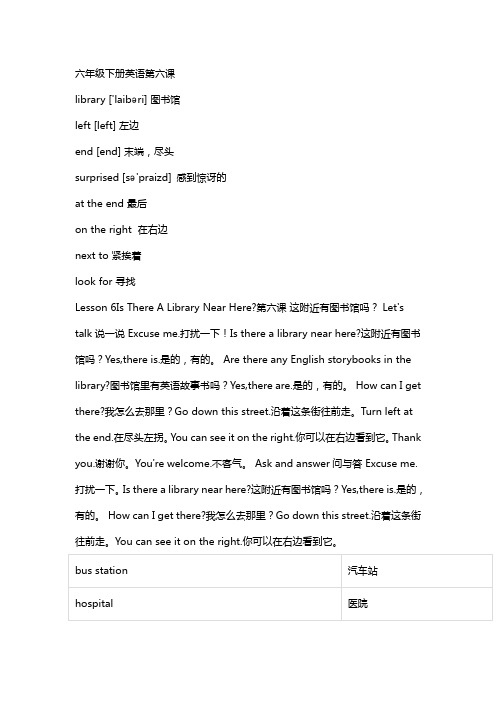
六年级下册英语第六课library ['laibəri] 图书馆left [left] 左边end [end] 末端,尽头surprised [sə'praizd] 感到惊讶的at the end 最后on the right 在右边next to 紧挨着look for 寻找Lesson 6Is There A Library Near Here?第六课这附近有图书馆吗? Let's talk说一说 Excuse me.打扰一下!Is there a library near here?这附近有图书馆吗?Yes,there is.是的,有的。
Are there any English storybooks in the library?图书馆里有英语故事书吗?Yes,there are.是的,有的。
How can I get there?我怎么去那里?Go down this street.沿着这条街往前走。
Turn left at the end.在尽头左拐。
You can see it on the right.你可以在右边看到它。
Thank you.谢谢你。
You're welcome.不客气。
Ask and answer问与答 Excuse me.打扰一下。
Is there a library near here?这附近有图书馆吗?Yes,there is.是的,有的。
How can I get there?我怎么去那里?Go down this street.沿着这条街往前走。
You can see it on the right.你可以在右边看到它。
Let's sing唱一唱 Bingo《宾果》There is a farmer(who)has a dog.有一个农夫养了一条狗。
And Bingo is his name,sir!宾果是他的名字,先生!B-I-N-G-O, B-I-N-G-O,B-I-N-G-O.And Bingo is his name,sir!宾果是他的名字,先生!B-I-N-G-O,B-I-N-G-O,B-I-N-G-O。
新概念英语第一册笔记-第6课

新概念英语笔记·第一册
新概念英语笔记第一册
Lesson 6 What make is it?
[词汇](13)
make n.(产品)牌号
Swedish adj.瑞典的
English adj.英国的
American adj.美国的
Italian adj.意大利的
Volvo n.沃尔沃(Swedish)
Peugeot n.标致(French)
Mercedes n.梅赛德斯(German)
Toyota n.丰田(Japanese)
Daewoo n.大宇(Korean)
Mini n.迷你(English)
Ford n.福特(American)
Fiat n.菲亚特(Italian)
✓make n.(产品的)牌子;类型,型号;式样
What make is your watch?
Her dress is of Italian make. 她的连衣裙是意大利式的
✓English adj. 英国(人)的;英格兰(人)的;英国化的
John is very English. 约翰生活行事非常英国化。
[语法]
选择疑问句:
选择疑问句:在两者或三者中进行选择,用特殊颖问词or进行连接。
选择疑问句词调一般是前升后降,选择疑问句的回答必须要用完整的句子回答。
Is she a Chinese teacher or a Japanese teacher?
She isn't a Chinese teacher. She's a Japanese teacher.。
高一上册第六课知识点汇总
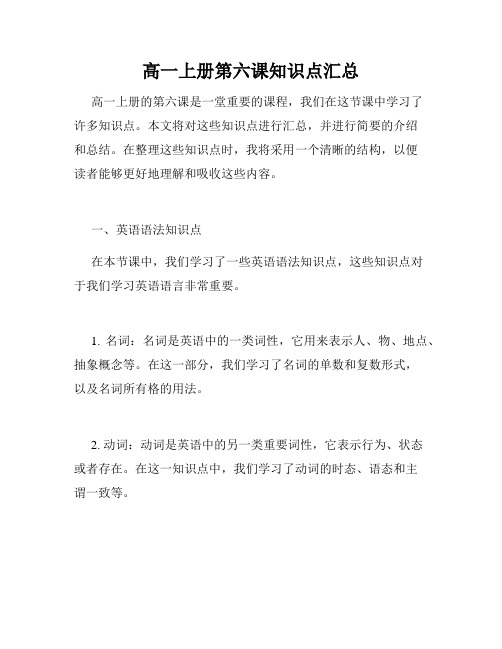
高一上册第六课知识点汇总高一上册的第六课是一堂重要的课程,我们在这节课中学习了许多知识点。
本文将对这些知识点进行汇总,并进行简要的介绍和总结。
在整理这些知识点时,我将采用一个清晰的结构,以便读者能够更好地理解和吸收这些内容。
一、英语语法知识点在本节课中,我们学习了一些英语语法知识点,这些知识点对于我们学习英语语言非常重要。
1. 名词:名词是英语中的一类词性,它用来表示人、物、地点、抽象概念等。
在这一部分,我们学习了名词的单数和复数形式,以及名词所有格的用法。
2. 动词:动词是英语中的另一类重要词性,它表示行为、状态或者存在。
在这一知识点中,我们学习了动词的时态、语态和主谓一致等。
3. 形容词和副词:形容词和副词用来修饰名词或者动词,使我们的语言更加详细和具体。
我们学习了形容词和副词的比较级和最高级形式,以及一些常见的形容词和副词的用法。
4. 介词和介词短语:介词是连接词的重要一类,它用来表达方向、位置、时间、原因等。
我们学习了一些常见的介词和常见的介词短语的用法。
二、英语词汇知识点除了语法知识点外,我们还学习了一些重要的英语词汇。
1. 常用词汇:在这一部分中,我们学习了一些常见的英语词汇,这些词汇是我们学习英语的基础。
2. 词汇扩展:除了常用词汇外,我们还学习了一些扩展词汇,这些词汇可以帮助我们更好地理解和运用英语。
三、阅读与写作技巧本节课还介绍了一些阅读与写作技巧,这些技巧可以帮助我们更好地理解文章并提高写作能力。
1. 阅读技巧:在这一部分中,我们学习了如何提高阅读理解能力,包括提取关键信息、推断上下文含义等。
2. 写作技巧:作为英语学习的重要组成部分,写作技巧对于我们的学习和交流非常关键。
我们学习了一些写作技巧,包括如何组织语言、如何表达观点等。
四、听力和口语训练在这节课中,我们还进行了一些听力和口语训练,这些活动可以帮助我们提高听力和口语能力。
1. 听力技巧:我们学习了如何提高听力理解能力,包括注意关键词、预测答案等。
第六课课文详解
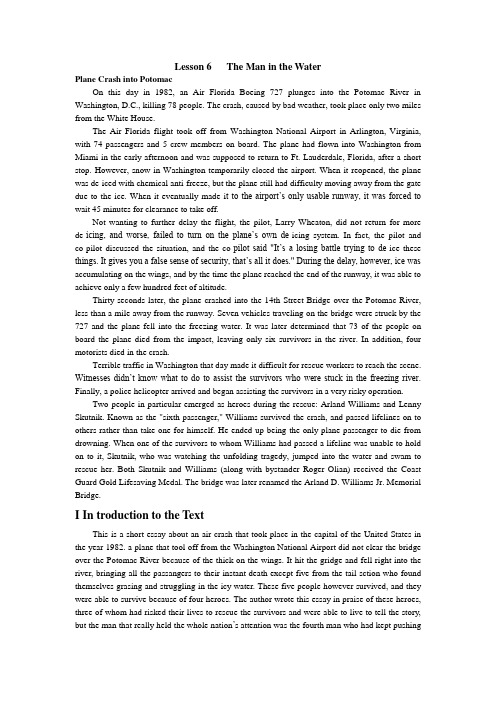
Lesson 6 The Man in the WaterPlane Crash into PotomacOn this day in 1982, an Air Florida Boeing 727 plunges into the Potomac River in Washington, D.C., killing 78 people. The crash, caused by bad weather, took place only two miles from the White House.The Air Florida flight took off from Washington National Airport in Arlington, Virginia, with 74 passengers and 5 crew members on board. The plane had flown into Washington from Miami in the early afternoon and was supposed to return to Ft. Lauderdale, Florida, after a short stop. However, snow in Washington temporarily closed the airport. When it reopened, the plane was de-iced with chemical anti-freeze, but the plane still had difficulty moving away from the gate due to the ice. When it eventually made i t to the airport’s only usable runway, it was forced to wait 45 minutes for clearance to take off.Not wanting to further delay the flight, the pilot, Larry Wheaton, did not return for more de-icing, and worse, failed to turn on the plane’s own de-icing system. In fact, the pilot and co-pilot discussed the situation, and the co-pilot said "It’s a losing battle trying to de-ice these things. It gives you a false sense of security, that’s all it does." During the delay, however, ice was accumulating on the wings, and by the time the plane reached the end of the runway, it was able to achieve only a few hundred feet of altitude.Thirty seconds later, the plane crashed into the 14th Street Bridge over the Potomac River, less than a mile away from the runway. Seven vehicles traveling on the bridge were struck by the 727 and the plane fell into the freezing water. It was later determined that 73 of the people on board the plane died from the impact, leaving only six survivors in the river. In addition, four motorists died in the crash.Terrible traffic in Washington that day made it difficult for rescue workers to reach the scene. Witnesses didn’t know what to do to assist the survivors who were stuck in the freezing river. Finally, a police helicopter arrived and began assisting the survivors in a very risky operation.Two people in particular emerged as heroes during the rescue: Arland Williams and Lenny Skutnik. Known as the "sixth passenger," Williams survived the crash, and passed lifelines on to others rather than take one for himself. He ended up being the only plane passenger to die from drowning. When one of the survivors to whom Williams had passed a lifeline was unable to hold on to it, Skutnik, who was watching the unfolding tragedy, jumped into the water and swam to rescue her. Both Skutnik and Williams (along with bystander Roger Olian) received the Coast Guard Gold Lifesaving Medal. The bridge was later renamed the Arland D. Williams Jr. Memorial Bridge.I In troduction to the TextThis is a short essay about an air crash that took place in the capital of the United States in the year 1982. a plane that tool off from the Washington National Airport did not clear the bridge over the Potomac River because of the thick on the wings. It hit the gridge and fell right into the river, bringing all the passangers to their instant death except five from the tail sction who found themselves grasing and struggling in the icy water. These five people however survived, and they were able to survive because of four heroes. The author wrote this essay in praise of these heroes, three of whom had risked their lives to rescue the survivors and were able to live to tell the story, but the man that really held the whole nation’s attention was the fourth man who had kept pushinghis lifeline救生索and flotation rings救生圈to others until he went under.Heroism of course has always been admired. But this man’s heroism was unusual. People usually expect revolutionaries to die martyrs; they also expect true believers to be willing to die for their faith; they might also expect some people to be ready to lay down their lives in performing their duty; they also believe that many people would show courage in their attempt to win power, influence, money or to save their loved ones. But this man in the water did not fit in any of these descriptions. He did not have to give his rings to others; he did not even know these people; and he died anonymous, unidentified. He was extraordinary precisely because he was ordinary. He shoued what everyone of us could do. The display of his heroism was a song to the beautiful human character. In our world today, we do not have to be reminded that there are a lot of displayss of human weakness. But it is this kind of true story that reminds us that we have no reason to be pessimistic or cynical.The fact that this hero happened to be an American should not bother us. When people talk about the American character, they sometimes go to an extreme. But blind hatred is just as wrong as blind worship. The United States has their share of human trash垃圾of course, but they also have numerous decent, honest, brave people like the one in the water who have made their country what it is today. And it is this side of their national character we should learn from.II Detailed Discussion of the Text1.As disaster go, this one was terrible, but not unique, certainly not among the worst U.S.air crashes on record.Air crashes usually involve a heavy loss of lives. Comapred with other air crashes, this one was not the worst. This air crash was remembered for a different reason.as disasters go: compared with the average disaster of this type.More examples of the use of “as something goes”:As writers go, Oscar Wilde was not the most talented. But he was among the most popullar.As businessmen go, he is considered pretty honest.2.There was the unusual element of the bridge , of course, and the fact that the plane hit it at amoment of high traffic.One thing that was unusual about this disaster was that the plane hit the bridge.“Element” here means “factor”.high traffic: heavy traffic; heavy flow of vehicles along the road3.Washington, the city of form and rules, turned chaotic by a blast of real winter and a singleslap of metal on metal.the city of form and rules: See Note in Notes to the Text.turned chaotic: became chaotic; was thrown into a terrible confusiona blast of real winter: a sudden strong really could windThe word”blast” could also refer to a sudden explosion or a sudden very loud noise, e.g.The human-bomb exploded and more than 20 people were killed in the terrible blast.The music came in full blast form the next door, and I had to call the police to stop it.slap: a quick blow with something flat as in “a slap across the face”. Here of course it is used figuratively.4.presidential monumentsSee Note 3 in Notes to the Text.5.And there was the aesthetic clash as well---blue-and-green Air Florida, … sunk down amonggray chunks of ice in a black river.When the air crash occurred, it was not just a clash (a loud sound made by two objects) of metal against the bridge, but also a clash between colors: the blue-green color of the plane and the gray and black color of the ice and river.the aestheitc clash:the combination of different colors which look very bad (“aesthetic”: something connected with the study of beauty)Air Florida: The Florida Airlline. Also: Air France; Air Japan (JAL)chunk: a fairly large amount of, e.g.a chunk of meat; a chunk of rice6.Still, there was nothing very special in any of it, except death, which, while always special,does not necessarily bring millions to tears or to attention.while aways special: although (it is) always special, e.g.Money, while desirable and useful, can corrupt.Their life, while rich and comfortable, somehow lacks meaning.not necessarily: possibly but not certainly, e.g.New things are not necessarily better.Teachers do not necessarily know more than students sometimes.bring millions to tears or to attention:make millions cry or attract millions of people’s attention7.Why, then, the shock here?(1)Why was there such a shock here?Notice the structure of this kind of elliptical sentence, e.g.Five o’clock? Why so early?To go to Afghanistan? Wy me?If so many businesses can’t compete with other countries, why WTO then?8. a mechanical failureWe are talking about the cause of the disaster there: whether it is a mechanical problem or a human error.9.Here, after all, were two forms of nature in collision: the elements and human character.the elements: the bad weatherthe two forms of nature: the bad weather and the human character. Both are forms of natural power.collision:clash; two people or vehicles or ideas hitting each other while moving directly toward each otherNote: Do not mix up with the word “coalition”.st Wednesday, the elements, indifferent as ever, brought down Flight 90. And on that sameafternoon, human nature---groping and struggling ---rose to the occasion.(2)indifferent as ever: unconcerned about the consequences as alwaysbrought down: made the plane fall downNotice the difference between these sentences:A.The plane fell into the river.They brought down an enemy plane by bulletsB.He grew up in a small mountain village.He was brought up by his siter-in-law.C.The fire went out after two weeks.The fire was brought under control in the end.flight: It refers to a plane making a particular journey.rise to the occasion: to deal successfully with a dificult situation or problem, e.g.I’m sure that he will rise to the occasion when he realizes what is at stake.groping and struggling: groping for the flotation rings and struggling in the icy waterBut these two words may also be interpreted figuratively, referring to human nature.11.Of the four acknowledged heroes of the event, three are able to account for their behavior.Only three out of these four heroes lived to tell people what they actually had done nand now they had rescued the five survivors.account for: to give a satisfactory explanation of what has happened.12.Donald Usher … a park police helicopter team, risked their lives every time they dipped intothe water to pick up survivors.park police: police whose job it is to look after a park.every time: whenever13.… they described their courage as all in the line of duty.in the line of duty: as part of one’s duty, e.g.They are paid by the people to provide these services. It’s all in the line of duty.14.“It’s something I never thought I would do.”“I never thought I would have the courage to jump into th eicy water to rescue somebody.”“It” here refers to his heroic deed.15.…delivering every hero’s line that is no less admirable for being repeated.… saying something that has been said before by many people in similar situations, but it is still admirable.deliver a line: to make a remark. Also: to deliver a pseech; to deliver a lecture16.That somebody actually did so is part of the reason this particular tragedy sticks in themind.(3)English, we usually turn them into appositive clauses byadding the word “fact”. For example: The fact that somebody actually did so is part of the reason this particular tragedy sticks in the mind.stick in the mind: to be remembered17.… responsible for the emotional impact of the disaster(4)being the reason for the emotional impact of the disasteremotional impact of the disaster: how this disaster has moved peoplebe responsible for: to be the cause for, e.g.That policy was largely responsible for the mass hunger.The favorable weather conditions were partly responsible for our good harvest last year.18.This man was escribed … as appearing alert and in control.This man was described as a person who appeared alert andin control.alert and in control:able to think quickly and clearly; calm and with perfect presence of mind, e.g.although she is almost ninety, she still has an alert mind.19.Every time they lowered a lifeline and flotation ring to him, he passed it on to another of thepassengers.lifeline: a rope used to rescue people at seaflotation ring: some kind of life-belt or life-preserver20.“In a mass casualty, you’ll find people like him. But I’ve never seen one with thatcommitment.”We can always find hieroc people like him in a mass casualty because although not everyone is a hero, there’s bound to be a fair representation of heroes in a big crowd.mass casualty: large numbers of people hurt or killed in an accident or battle“Mass” here is an adjective as in mass murder, mass audiences, mass protest, etc.commitent: Here: a strong sense of reponsibility or loyaltyNotice how the word “commit” and its derivatives are used:WTO commits China to give national treatment to all foreign business people.China is commited to lower its tariffs.We have a strong commitment to follow WTO rules.21.When the helicopter came back for him theman had gone under.go under: to sink; to be drwoned, e.g.In a fierce competition, these oiirly managed enterprises will go under.In case of an economic recession, these old and weak people will be the first to go under.The captain hoped that help would come before the ship went under.22.His selflessness was one reason the story held national attention; his anonymity another.The fact that the man in the water who had displayed such heroism did not leave his name and no one was ever able to find it out was another reason why the whole nation felt so touched by this story. It showed that the man was a very ordinary citizen. It also proved that he did what he did not for fame or anythign.anonymity: the state of being unknown by nameanonymous: (adj.)He preferred to remain anonymous.The author of this book is anonymous.Note how the anonymity is formed. An-means without, and nym comes form anoma in late Laitn which means name.CF: antonym, synonym, homonym, pseudonym23.The fact that he went unidentified gave him a universal character.gave him a universal character: gave him a universal quality; made him a representative man, like everyone of us could be; made people feel that it could have been anyone24.For a while he was Everyman, and thus proof (as if one needed it) that no man is ordianry.Notice that the word “Everyman” is captialized. It echoes the title of a medieval play about a typical human being. It conveys the idea that this anonymous man really represents the best of numan nature. What he did was not the act of a supernatural being, but the act of an ordianry person. Yet, the author says here that “no man is ordinary”, because every person is an individual moral eitity and is capable of rising to the occasion and making history.25.Still, he could never have imagined such a capacity in himself.(5)However, it was impossible for him to know that he would be capable of such heroism.What the man did was the natural response to the cirtical situation.Notice the use of the word “in” here. It is used to say what one should consider in an other.More examples:We all see a promising scholar in her.I don’t know what she saw in that man. He seemed to be very common. But she lovedhim.26.Only minutes before his character was tested, he was sitting …,listening to the stewardesstelling him to fasten his seat belt and saying something about …The author is imaging what must have been the situation. He used the past continuous to make the narration more real and vivid.stewardess:“-ess” is a noun sufix referring to t female, e.g.waitress, actress, mistress, hostess, lioness, countess27.So our man relaxed with the others, some of whom would owe their lives to him.our man: our hero, the man we are talking about hereof whom: Notice that here only “whom” can be used, not “that” or “who”.owe: We can say “I owe him five dollars” or “I owe five dollars to him”. Similarly:We can say “He brought me a dictionary” or “He bought a dictionary for me”, “It costs us a lot of money” or “It costs a lot of money to us”.28.…or to regret some harsh remark made in the office that morning.… or to feel sorry for the unkind things he might have said to his employee in the office that morning before he took the plane.The author imagined the man to be some kind of business executive.29.Like every other person on the flight, he was desperate to live, which makes his final act sostunning.His last act was stunning because like everyone else, he also valued his life and was desperate to live.stunning: shockingon that fllight: on board that plane“Which” here stands for what has been stated before.30.For at some moment in the water he must have realized that he would not live if he continuedto hand over the rope and ring to others. He had to know it, no matter how slow with effect of the cold.(6)Obviously it requires much more courage to face sure death knowing that you have a choice (keep one of the rings for yourself) than to face the possibility of death by, for example, a stray bullet in battle. The man in the story did not act on impulse. He did not pass on his rings to others with a total unawareness of the consequences. At some point he must have known that he was freeaing to death and would go under any moment. But he still gave the chance for survival to the next person.no matter how slow the effect: however slow the effect of the cold might be31.Yet there was something else about our man that kept our thoughts on him, (7)that kept our thoughts on him: that held our attention to him; that made us think of him all the time32.He was there, in the essential, classic circumstance.What happened that day was a typical situation in which nature and man fought each other.And when nature begins to show its power, you always find man fighting back. He is alwaysthere. We can always expect to find such a hero.essential: basic, typical, the most importantclassic: very traditional or lang establlished33.So the age-old battle began again in the Potomac. For as long as that man could last, theywent at each other, nature and man…the age-old battle between nature and man: the author is using a very traditional idea here, the idea that huma civilized is a record of man’s gradual conquest of nature.go at: to attack; to start to fight, e.g.Those companies went at eachi other like hungry wolves.34.…the one making no distinctions of good and evil, acting on no principles offering nollifelines, the other acting wholly on distinctions, principles and perhaps, on faith.Nature is indifferent. It does not have any idea what is good or what is bad for human beings, and it does not care. It has no moral principles. Human beings, on the other hand, are different.They have moral standards. They have feelings. They care and they love. Therefore they are able to choose between right and wrong.35.In reality, we believe the opposite, and it takes the act of theman in the water to remind us ofour true feelings in this matter.(8)Actually, the death of the man did not mean that human beings had lost the battle. In moral sense, man had won, because man’s courage to defy death was also a trementdous power.Therefore what happened to this man in the water should fill us with pride rather than sadness.36.It is not to say that everyone would have acted as he did (8)It is not to say: It does not mean37.Yet whatever moved these mento challenge death on behalf of their fellows is not peculiar tothem. Everyone feels the possibility in himself.Yet whatever enabled or made these men or gave these men the power to challenge death is not unique. Indeed, every one of us has the potentiality to be a hero.38.That is the enduring wonder of the story. That is why we would not let go of it.That is the lasting wonder of the story. That is what keeps our thoughts on this story. (That is why we keep thinking about this story. Thatis why this story will always livein our memory.) go of it39.If the man in the water gave a lifeline to the people gasping for survival, he was likewisegiving a lifeline to those who watched him.In this article, the author is giving the man’s action a symbolic meaning. When the man was giving a lifeline to the people gasping for survival, we might say that he was also giving the chance to live to everyone of us. He was showing by his own example the neaning of life, the dignity of human existence, the power of nobe human character.likewise: in the same way40.“Everything in Nature containshe powers of nature,” said Emerson.(9)For Emerson, see Note 11 in Notes to the Text.By “the powers of nature”, Emerson did not just mean such powers as coming from coal, oil, water,wind, etc. (He could haveincluded nuclear power if he had been able to see that far into the future.) He probably also meant the power unique to human beings: the power to love, the power to change, and the power to create.41.The man in the water set himself against an immovable, impersonal enemy; he fought it withkindness; and he held it to a standoff. He was the best we can do.set sb. against sb.: to make sb. start to fight or quarrel with another person, esp. a person with whom they had friendly relations before. e.g.There were outside forces who were trying to set one tribe against another. That was why there were endless civil wars in the country.I’m not going to set myself against my own classmates.An immovable, impersonal enemy: It refers to nature, which is indifferent and cannot be persuaded to change its attitude towards us humans. “Immovable” here means “impossible to be changed or persuaded”.standoff: a situation in which neither side in a fight or battle can gain an advantage.He was the best we can do: The man in the water represented human nature at its best.III Translation of Text A“水中人”就灾难而言,这一次很可怕,但不是前所未有,当然更算不上美国空难史中最惨烈的一场。
新概念第一册Lesson 6 知识要点总结
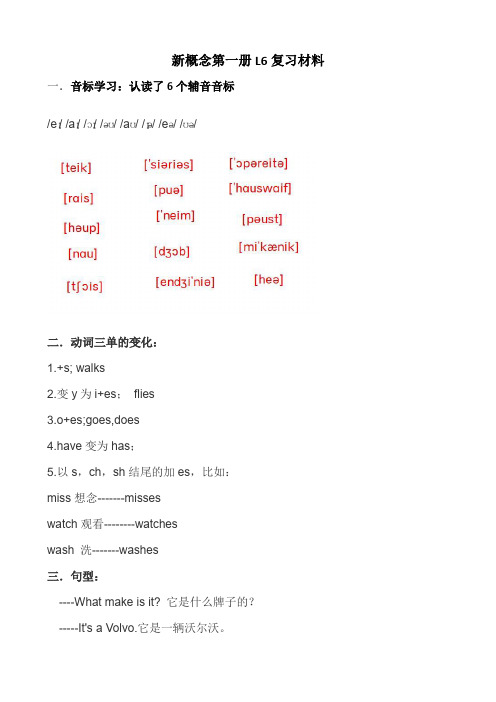
新概念第一册L6复习材料一.音标学习:认读了6个辅音音标/eɪ/ /aɪ/ /ɔɪ/ /əʊ/ /aʊ/ /ɪə/ /eə/ /ʊə/二.动词三单的变化:1.+s; walks2.变y为i+es;flies3.o+es;goes,does4.have变为has;5.以s,ch,sh结尾的加es,比如:miss想念-------misseswatch观看--------watcheswash 洗-------washes三.句型:----What make is it? 它是什么牌子的?-----It's a Volvo.它是一辆沃尔沃。
-----What do you do every day?你每天干什么?------I sleep every day. 我每天睡觉。
------What does he do every day?他每天干什么?------He sleeps every day.他每天睡觉。
------Is she an American student or an English student?她是美国学生还是英国学生?------She is an American student.她是英国学生。
-------Is it an Italian car or a French car?它是一辆意大利车还是法国车?-----It's an Italian car.它是一辆意大利车。
四.主要词汇:nationality(国籍)make(牌号)Swedish(瑞典的)English(英国的)American(美国的)Italian(意大利的)。
新概念英语第二册第6课 完整

9 Who told you about him later? A neighbour did.
4.In return for this, the beggar stood on his head and sang songs. in return for this 作为对……的回报
He doesn't want anything in return.
4.In return for this, the beggar stood on his head and sang songs.
不使用冠词的情况
零冠词的用法
1. 名词前有了物主代词、指示代词、不定代词和“S”所有格时。
e.g. Our books those apples Jim’s pen
2. 附复数名词在表示一类人或者事物时。 e.g. They are teachers. 他们是老师。
3. 在专有名词前 e.g. China England
She gave him a meal.
New Lesson
6 He didn’t pay you for the meal, did he? No, he didn’t.
7 What did he do in return for it? He stood in his head and sang songs.
Yes, she has.
2.Who knocked at her door yesterday?
八年级上册英语第六课笔记
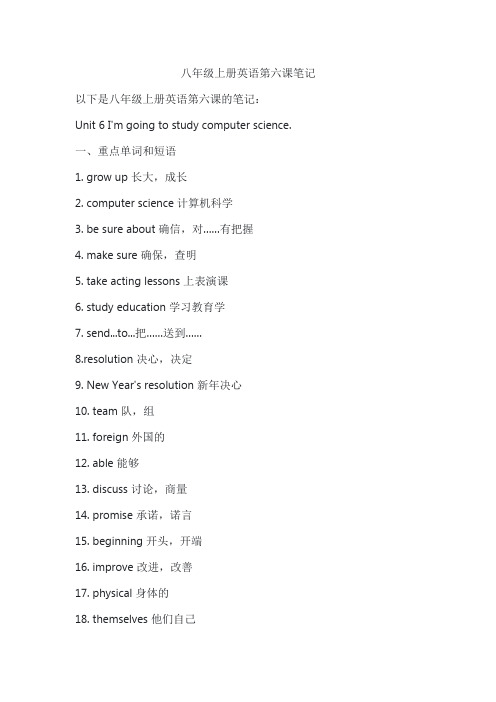
八年级上册英语第六课笔记以下是八年级上册英语第六课的笔记:Unit 6 I'm going to study computer science.一、重点单词和短语1. grow up 长大,成长2. computer science 计算机科学3. be sure about 确信,对……有把握4. make sure 确保,查明5. take acting lessons 上表演课6. study education 学习教育学7. send...to...把……送到……8.resolution 决心,决定9. New Year's resolution 新年决心10. team 队,组11. foreign 外国的12. able 能够13. discuss 讨论,商量14. promise 承诺,诺言15. beginning 开头,开端16. improve 改进,改善17. physical 身体的18. themselves 他们自己19. hobby 业余爱好20. weekly 每周的二、重点句型1. What do you want to be when you grow up? 你长大后想成为什么?2. I'm going to study computer science. 我打算学习计算机科学。
3. How are you going to do that? 你打算怎么做?4. I'm going to take acting lessons. 我打算上表演课。
5. Where are you going to work? 你打算在哪里工作?6. When are you going to start? 你打算什么时候开始?7. I'm not sure about that. 我对那件事不确定。
8. Make sure you try your best. 确保你尽力了。
高一英语第六课知识点
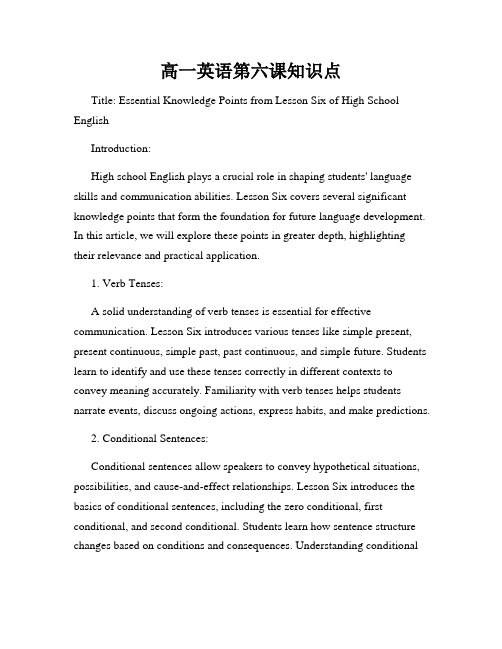
高一英语第六课知识点Title: Essential Knowledge Points from Lesson Six of High School EnglishIntroduction:High school English plays a crucial role in shaping students' language skills and communication abilities. Lesson Six covers several significant knowledge points that form the foundation for future language development. In this article, we will explore these points in greater depth, highlighting their relevance and practical application.1. Verb Tenses:A solid understanding of verb tenses is essential for effective communication. Lesson Six introduces various tenses like simple present, present continuous, simple past, past continuous, and simple future. Students learn to identify and use these tenses correctly in different contexts to convey meaning accurately. Familiarity with verb tenses helps students narrate events, discuss ongoing actions, express habits, and make predictions.2. Conditional Sentences:Conditional sentences allow speakers to convey hypothetical situations, possibilities, and cause-and-effect relationships. Lesson Six introduces the basics of conditional sentences, including the zero conditional, first conditional, and second conditional. Students learn how sentence structure changes based on conditions and consequences. Understanding conditionalsentences helps students express desires, give advice, make predictions, and discuss imaginary scenarios.3. Passive Voice:The passive voice is widely used in both written and spoken English. Lesson Six delves into the structure and usage of the passive voice, emphasizing its role in shifting the focus from the doer of an action to the receiver. Students explore various tenses in the passive voice and learn to identify when it is appropriate to use this construction. Command over the passive voice enables students to write more diverse and sophisticated sentences, as well as read and understand a wide range of texts.4. Reported Speech:Reported speech allows individuals to report conversations and thoughts indirectly. Lesson Six introduces the transformation of direct speech into reported speech, paying attention to changes in verb tenses, pronouns, and time and place references. Students practice converting statements, questions, commands, and exclamations into reported speech, expanding their abilities to retell conversations and relay information accurately.5. Adverbial Clauses:Adverbial clauses function as adverbs within a sentence, adding details about time, place, manner, condition, purpose, or reason. Lesson Six explores different types of adverbial clauses, such as time clauses, place clauses, condition clauses, and purpose clauses. Students learn to identify and use these adverbial clauses appropriately to provide additional information and enhance sentence complexity.Conclusion:Mastering the knowledge points covered in Lesson Six of high school English paves the way for continuous language development and effective communication. Verb tenses, conditional sentences, passive voice, reported speech, and adverbial clauses are all essential tools that broaden students' linguistic capabilities. By understanding and applying these points, students gain confidence in expressing themselves accurately and concisely in both spoken and written English.。
七年级英语6课知识点
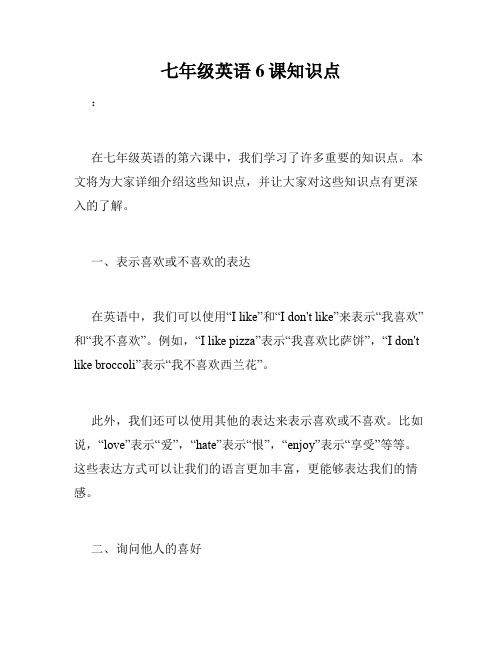
七年级英语6课知识点:在七年级英语的第六课中,我们学习了许多重要的知识点。
本文将为大家详细介绍这些知识点,并让大家对这些知识点有更深入的了解。
一、表示喜欢或不喜欢的表达在英语中,我们可以使用“I like”和“I don't like”来表示“我喜欢”和“我不喜欢”。
例如,“I like pizza”表示“我喜欢比萨饼”,“I don't like broccoli”表示“我不喜欢西兰花”。
此外,我们还可以使用其他的表达来表示喜欢或不喜欢。
比如说,“love”表示“爱”,“hate”表示“恨”,“enjoy”表示“享受”等等。
这些表达方式可以让我们的语言更加丰富,更能够表达我们的情感。
二、询问他人的喜好当我们想知道他人的喜好时,可以使用“How about you?”的表达方式。
比如说,“I like ice cream. How about you?"表示“我喜欢冰淇淋。
你呢?”这种表达方式可以让我们更好地了解对方,从而加深彼此的了解。
三、辨认物品在英语中,我们需要学会辨认物品。
为此,我们需要掌握颜色、形状、大小等基本词汇。
比如说,“red”表示“红色”、“square”表示“正方形”、“small”表示“小的”等等。
除此之外,我们还需要学会使用“this”和“that”来指代所描述的物品。
例如,“This is a pen. That is a pencil.”表示“这是一支笔。
那是一支铅笔。
”这种表达方式可以让我们在描述物品时更加清晰明了。
四、表达时间了解如何表达时间也是非常重要的。
在英语中,我们可以使用“o'clock”、“half past”和“quarter past/quarter to”来表示时间。
例如,“It's 3 o'clock”表示“现在是三点钟”,“It's half past four”表示“现在是四点半”,“It's quarter to six”表示“现在是六点差一刻”。
七年级英语下册第6课知识点

七年级英语下册第6课知识点七年级英语下册第6课主要涵盖了家庭成员的称呼和家庭生活相关词汇。
本篇文章将从以下几个方面进行探究。
一、家庭成员的称呼在英语中,不同的家庭成员有不同的称呼,下面列举一些常见的称呼及其对应的家庭成员:1. Father:父亲;2. Mother:母亲;3. Grandfather:爷爷;4. Grandmother:奶奶;5. Brother:兄弟;6. Sister:姐妹;7. Uncle:叔叔、舅舅;8. Aunt:阿姨、舅妈;9. Cousin:表兄弟姐妹、堂兄弟姐妹。
以上这些家庭成员的称呼是英语中最基本且最常见的。
学生们在学习英语中需要掌握这些基础知识。
二、家庭生活相关词汇1. House:房子;2. Room:房间;3. Living room:客厅;4. Bedroom:卧室;5. Bathroom:浴室;6. Kitchen:厨房;7. Dining room:餐厅;8. Garden:花园。
以上这些词汇与家庭生活密切相关,学生们在学习英语中需要熟练掌握。
三、家庭成员的职业在英语中,我们也可以用职业来描述家庭成员。
下面列举一些常见的职业及其对应的家庭成员:1. Doctor:医生;2. Teacher:老师;3. Engineer:工程师;4. Lawyer:律师;5. Businessman:商人;6. Policeman:警察;7. Fireman:消防员。
以上这些职业与现代人的生活息息相关,学生们应该在学习英语中熟练掌握。
四、家庭成员的特点除了职业和称呼之外,我们还可以用一些特点词汇来描述家庭成员。
下面列举一些常见的特点词汇及其对应的家庭成员:1. Kind:善良的;2. Funny:有趣的;3. Smart:聪明的;4. Active:活泼的;5. Shy:害羞的;6. Patient:耐心的。
以上这些词汇可以让我们更准确地描述家庭成员的特点,对培养学生的英语写作能力有着重要的意义。
第六课 Lesson Six
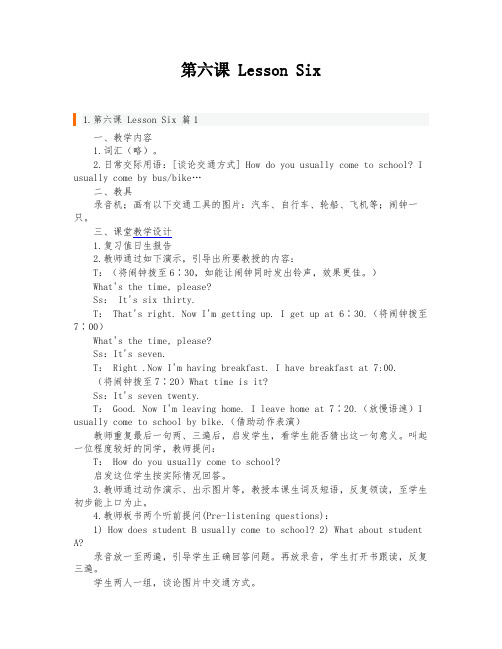
第六课 Lesson Six1.第六课 Lesson Six 篇1一、教学内容1.词汇(略)。
2.日常交际用语:[谈论交通方式] How do you usually come to school? I usually come by bus/bike…二、教具录音机;画有以下交通工具的图片:汽车、自行车、轮船、飞机等;闹钟一只。
三、课堂教学设计1.复习值日生报告2.教师通过如下演示,引导出所要教授的内容:T:(将闹钟拨至6∶30,如能让闹钟同时发出铃声,效果更佳。
)What's the time, please?Ss: It's six thirty.T:That's right. Now I'm getting up. I get up at 6∶30.(将闹钟拨至7∶00)What's the time, please?Ss:It's seven.T: Right .Now I'm having breakfast. I have breakfast at 7:00.(将闹钟拨至7∶20)What time is it?Ss:It's seven twenty.T:Good. Now I'm leaving home. I leave home at 7∶20.(放慢语速)I usually come to school by bike.(借助动作表演)教师重复最后一句两、三遍后,启发学生,看学生能否猜出这一句意义。
叫起一位程度较好的同学,教师提问:T: How do you usually come to school?启发这位学生按实际情况回答。
3.教师通过动作演示、出示图片等,教授本课生词及短语,反复领读,至学生初步能上口为止。
4.教师板书两个听前提问(Pre-listening questions):1) How does student B usually come to school? 2) What about student A?录音放一至两遍,引导学生正确回答问题。
六年级第六课

seed soil First ,we have the seed.
sprout Add water often . plant Put the pot under the sun . Plant the seeds in the soil. Wait for a flower to grow. Wait for a sprout.
freeze expand
结冰 变大, 变大,扩大
otherwise 除此之外,否则 除此之外, goodness 上帝,天啊 上帝,
First the sea,
Let’s chant.
Hale Waihona Puke Then the sun, Next the clouds, The rain has fun. First the rain , And then the sea, Next the sun , Then clouds over me.
flour wheat
面粉 小麦
Where does the rain come from ? It comes from the clouds. Where does the cloud come from? It comes from the vapour.
Where does the vapour come from ? It comes from the water in the river. How can the water become vapour? The sun shines and the water becomes vapour.
several 几个 day天 see看见 pot 锅, 天 看见 碗,瓢,盆 lovely 可爱的 get得到 得到
英语下册第六课知识点总结
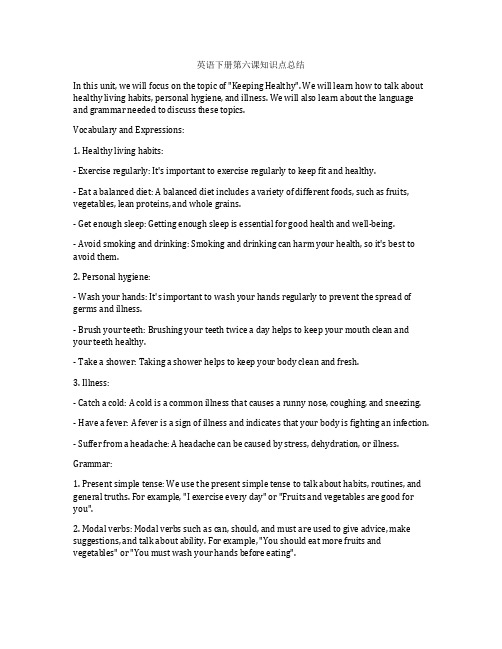
英语下册第六课知识点总结In this unit, we will focus on the topic of "Keeping Healthy". We will learn how to talk about healthy living habits, personal hygiene, and illness. We will also learn about the language and grammar needed to discuss these topics.Vocabulary and Expressions:1. Healthy living habits:- Exercise regularly: It's important to exercise regularly to keep fit and healthy.- Eat a balanced diet: A balanced diet includes a variety of different foods, such as fruits, vegetables, lean proteins, and whole grains.- Get enough sleep: Getting enough sleep is essential for good health and well-being.- Avoid smoking and drinking: Smoking and drinking can harm your health, so it's best to avoid them.2. Personal hygiene:- Wash your hands: It's important to wash your hands regularly to prevent the spread of germs and illness.- Brush your teeth: Brushing your teeth twice a day helps to keep your mouth clean and your teeth healthy.- Take a shower: Taking a shower helps to keep your body clean and fresh.3. Illness:- Catch a cold: A cold is a common illness that causes a runny nose, coughing, and sneezing. - Have a fever: A fever is a sign of illness and indicates that your body is fighting an infection. - Suffer from a headache: A headache can be caused by stress, dehydration, or illness. Grammar:1. Present simple tense: We use the present simple tense to talk about habits, routines, and general truths. For example, "I exercise every day" or "Fruits and vegetables are good for you".2. Modal verbs: Modal verbs such as can, should, and must are used to give advice, make suggestions, and talk about ability. For example, "You should eat more fruits and vegetables" or "You must wash your hands before eating".3. Adverbs of frequency: Adverbs such as always, often, sometimes, and never are used to talk about how often something happens. For example, "I always brush my teeth before bed" or "I never eat fast food".4. Imperatives: Imperatives are used to give direct orders or instructions. For example, "Wash your hands before eating" or "Exercise regularly for better health".Listening and Speaking:In this unit, we will practice listening to and speaking about health-related topics. We will listen to conversations about healthy living habits, personal hygiene, and illness. We will also practice speaking about our own habits and routines, giving advice to others, and talking about how to stay healthy.Reading and Writing:We will read texts about different health-related topics, such as the benefits of exercise, the importance of personal hygiene, and how to prevent illness. We will also practice writing about these topics, expressing our own opinions, and giving advice to others.Overall, this unit will help us to learn and talk about the importance of keeping healthy, and how to maintain a healthy lifestyle. We will also develop our listening, speaking, reading, and writing skills related to this topic. By the end of the unit, we should be able to discuss and give advice on how to keep a healthy lifestyle and the importance of personal hygiene.。
小学六年级英语冀教版第6课
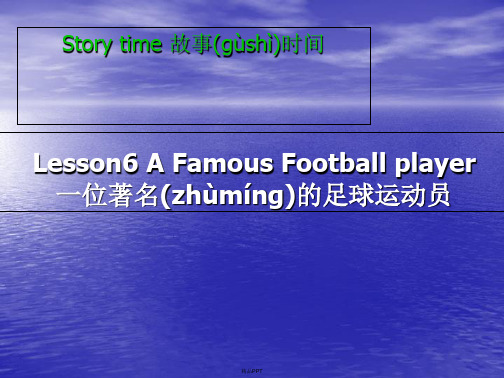
• The coach asked why.教练问为什么? • The boy said,"I can't buy a Christmas gift.男孩说:
“我不能个你买一份圣诞礼物。But I can dig a hole for your Charistmas tree.但是我可以为你的圣诞树挖 一个洞。”
为什么教练给了他一个足球作为礼物?
Because the coach thought that he would be a good player.
• What can you lean from Pele?你能贝利(pelé)
身上学到什么? If you work hard , you will be successful.
精品PPT
At Christmas time,the boy wanted to do something for the kind coach.
• 圣诞节,这个男孩想为那个(nà ge)善良的
教练做一些事情。
• He ran to the coach's home and dug a hole in front
精品PPT
词汇(cíhuì)全解
ago/ ə ' gou/adv.副词,以前。 形近词:age年龄。近义词:before以前 bottle/'bɔ tl/n.名词,瓶子。 短语: a bottle of...一瓶。。。。。 as/æ z/prep.介词,作为;如同(rútóng)。 coach/k əu tᶴ/n.名词,教练。 短语:a football coach足球教练。 would /wud/情态动词,要,肯;会, 表示愿意,喜欢。 gift/gift/n.名词,礼物。复数:gifts
- 1、下载文档前请自行甄别文档内容的完整性,平台不提供额外的编辑、内容补充、找答案等附加服务。
- 2、"仅部分预览"的文档,不可在线预览部分如存在完整性等问题,可反馈申请退款(可完整预览的文档不适用该条件!)。
- 3、如文档侵犯您的权益,请联系客服反馈,我们会尽快为您处理(人工客服工作时间:9:00-18:30)。
每个机械工人都对无热焊接很熟悉。冷压焊接 在某些情况下是很合适的生产焊接方法。除压 力焊接外,我们还可以用声波甚至激光来焊接。 面对历年创造的多样化焊接方法,我们必须在 这里采用下述焊接定义:“焊接是金属和塑料 不采用紧固件联接的方法”。
There is no uniform method of naming welding processes. Many processes are named according to the heat source or shielding method, but certain specialized processes are named after the type of joint produced. Examples are spot and butt welding. An overall classification can not take account of this because the same type of joint may be produced by a variety of processes. Spot welding may be done by electric resistance, arc, or electron-beam processes and butt welding by resistance, flash or any of a number of 铆钉,铆接
oxy- acetylene[ə`setili:n] 氧乙炔
flux [flʌks] 焊剂,(电、磁、光、辐射)通量
cathode [`kæθəʊd] 阴极,负极
anode [`æn,əʊd] 阳极,正极
ionize [`aiənaiz] 电离,离子化
plasma [`plæzmə]
命名焊接没有一致的方法。许多焊接过程
根据热源和保护方法来命名,某些专门的焊接 过程按照形成的联接形式来命名,例如点焊和 对焊。总体的分类不可能考虑这一点,因为同 样的联接可以通过许多焊接过程产生。点焊可 借助电阻焊、电弧焊或电子束焊来完成,而对 焊可以借助电阻焊、闪光焊(火花对焊)或其 他多种方法中的一种来完成。
Unit 6
welding
fusion [`fju:ʒən]
熔化,熔融 核聚变,热核反应; 联合, 合并 thermal fusion power generation 热核聚变发电 fusion formulae under high pressure 高压熔化方程
shield [ʃi:ld] 屏蔽,护罩,遮护 屏蔽,遮护,保护 保护人;保护物;掩护物;屏障 God is our shield. 神是我们的保护者。 His mother shield him from punishment. 他母亲保护了他,使他免受惩罚。
butt [bʌt] welding
对接焊 solder [`sɔdə] (低温)焊料 软钎焊,锡焊
solder these two pipes together. 把这两段管子焊接在一起。
bismuth [`bizməθ] 铋
cadmium [`kædmiəm] 镉 braze [breiz] 硬钎焊,铜焊
等离子体,血浆 industrial applications of plasma. 等离子体的工业应用
Welding techniques have become so versatile that it is difficult nowadays to define “ Welding”. Formerly welding was “the joining of metals by fusion, ”that is, by melting, but this definition will no longer do. Even though fusion methods are still the most common, they are not always used. Welding was next defined as the “joining of metals by heat,” but this is no longer a proper definition either. Not only metals can be welded. So can many of the plastic. Furthermore several welding methods do not require heat.
Every machinist is familiar with heatless welding.Cold pressure welding is a proper production welding method under some circumstances. Besides pressure welding,we can weld with sound and even with light from the famous laser. Faced with a diversit of welding methods that increase year by year, we must here adopt the following definition of welding: “Welding is the joining of metals and plastics by methods that do not employ fastening devices” .
焊接技术的应用如此广泛,以至于现在
都很难定义“焊接”了。原先,焊接被定义 为“通过熔融连接金属”,也就是说,通过 熔化,但这种定义已不再适用。尽管熔融法 仍然是最普通的,却并非总被采用。焊接随 后被定义为“借助热量将金属连接”,现在 这个定义也不完善。不仅金属可以焊接,很 多塑料也可以。尤其是很多焊接方法并不需 要热量。
